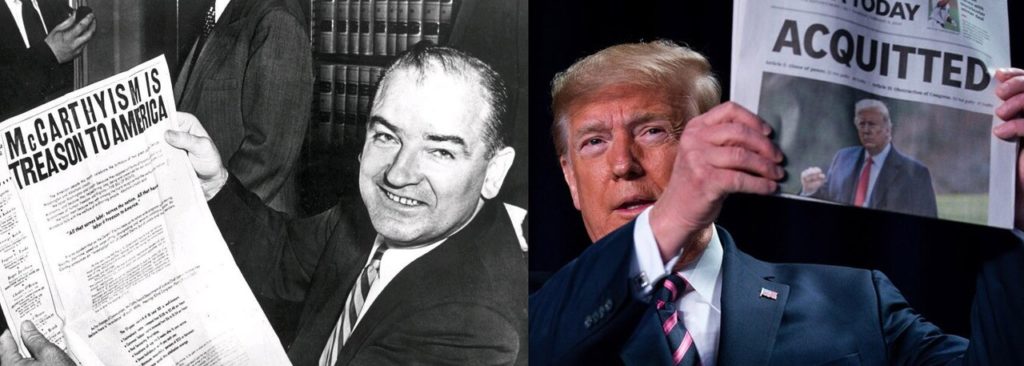
On February 9, 1950, Senator Joseph R. McCarthy stood before the County Women’s Republican Club in West Virginia and stated, “I have here in my hand a list of 205 [State Department employees] that were known to the Secretary of State as being members of the Communist Party and who nevertheless are still working and shaping the policy of the State Department.”
In the face of a Cold War with Russia, Americans first became fearful after the Soviets tested a nuclear device. McCarthy exploited that fear when—absent solid evidence—he subpoenaed, bullied, and badgered individuals he deemed enemies of the United States.
Annie Lee Moss was a communications clerk in the Pentagon when McCarthy called her before his committee to question her about her alleged membership in the communist party. A soft-spoken woman, Moss had difficulty with the questions and fumbled many of her responses suggesting just what McCarthy believed, that she was in fact a member of the communist party. While there was no solid evidence supporting McCarthy’s suggestions, his tactic of “guilt by association” took hold in the public’s minds which prompted this angry response from committee member Sen. John McClellan:
“You can’t strike these statements made by counsel here as to evidence that we’re having and withholding. You cannot strike that from the press nor from the public mind once it’s planted there. That’s the – that is the – evil of it. I don’t think it’s fair to a witness, to a citizen of this country, to bring them up here and cross-examine them, then when they get through, say ‘we’ve got something, the FBI’s got something on you that condemns you.’ It is not sworn testimony. It is convicting people by rumor and hearsay and innuendo.”
McCarthy’s fearmongering came to an end when CBS News journalist Edward R. Murrow exposed the Senate demagogue in a special broadcast. Using McCarthy’s own words against him, the American public awakened from their haze of fear.
“This is no time for men who oppose Senator McCarthy’s methods to keep silent, or for those who approve,” Murrow told his television audience. “We can deny our heritage and our history, but we cannot escape responsibility for the result. There is no way for a citizen of a republic to abdicate his responsibilities. As a nation we have come into our full inheritance at a tender age. We proclaim ourselves, as indeed we are, the defenders of freedom, wherever it continues to exist in the world, but we cannot defend freedom abroad by deserting it at home.”
Tens of thousands of letters, telegrams, and phone calls flooded into CBS in support of Murrow’s report, and McCarthy’s power and influence began to collapse as he faced his own Senate investigation and eventual censure by his Senate colleagues.
When the records of McCarthy’s closed hearings were made public in a 2003 report, Senators Susan Collins and Carl Levin wrote, “Senator McCarthy’s zeal to uncover subversion and espionage led to disturbing excesses. His browbeating tactics destroyed the careers of people who were not involved in the infiltration of our government. His freewheeling style caused both the Senate and the Subcommittee to revise the rules governing future investigations and prompted the courts to act to protect the Constitutional rights of witnesses at Congressional hearings… These hearings are a part of our national past that we can neither afford to forget nor permit to recur.”
The similarities between McCarthy and Donald Trump could not be more dangerously clear:
– McCarthy enjoyed publicity, especially negative.
– Trump loves negative publicity. It offers him the chance to label any and all sources as” fake” thereby continuing to feed his supporters any lie he chooses. (His favorite, of course is “The Big Lie,” that the 2020 elections was allegedly stolen.
– McCarthy poisoned people’s minds with insinuation, baseless lies, and fear.
– Donald Trump excels at poisoning his staunch base of supporters with lies and fear.
– The actions by both led many Americans to distrust individuals and government institutions.
– One believed his actions would lead to the presidency. The other became president whose autocratic tentacles touched many of the levers of power in Washington.
– For four years, McCarthyism, would damage the lives and careers of innocent Americans by assumption, innuendo, and a “list” he never revealed.
– Four years and counting, Trump continues to hold a Svengali-like grip over both his supporters and far too many Republicans who know better, but place Trump’s personality before principle in order to keep their jobs in Congress.
While Joseph McCarthy and McCarthyism ultimately extinguished themselves from the political stage, we continue to wait for Trump and Trumpism to do the same.
Monday: lessons learned.
Comments










